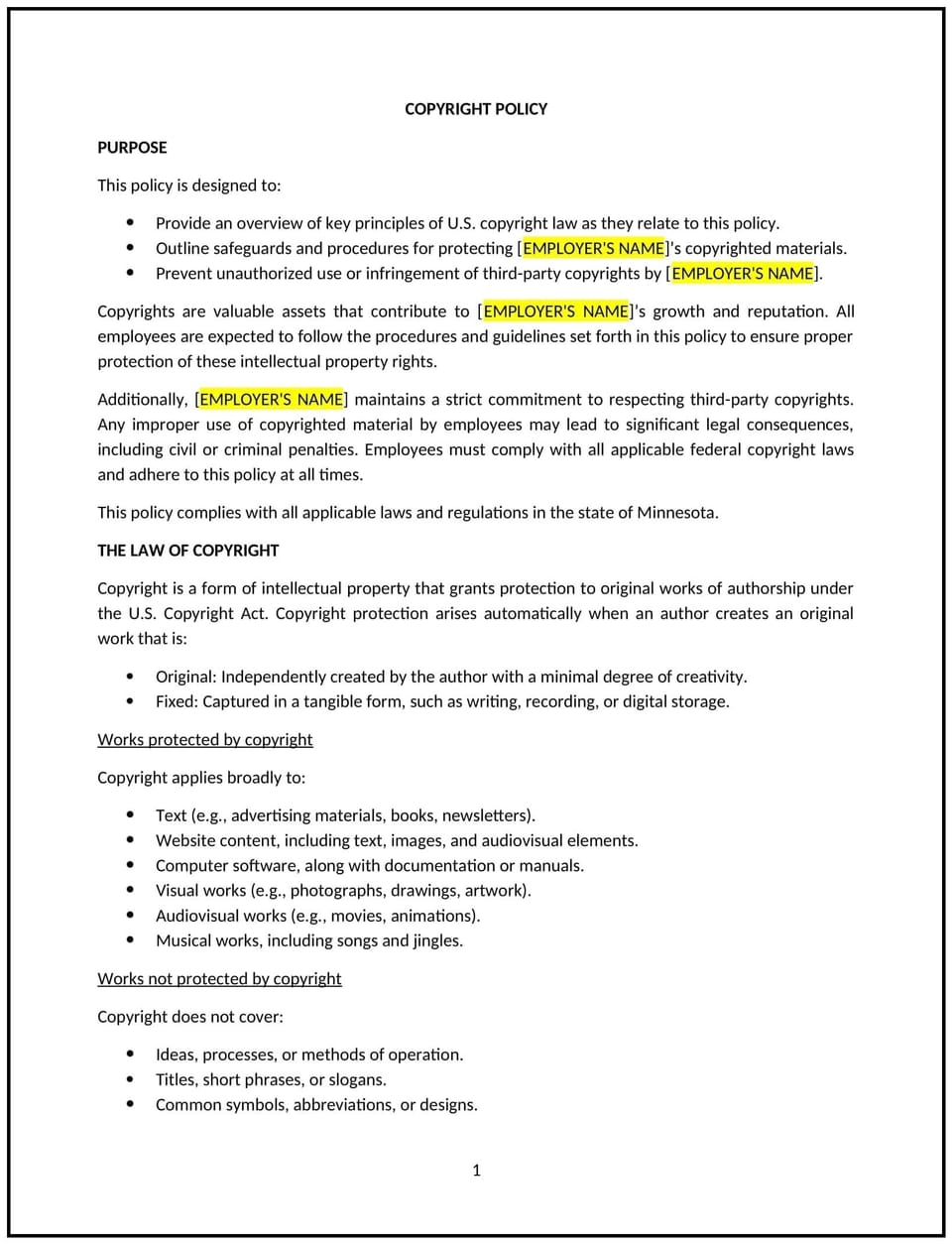Copyright policy (Minnesota): Free template

Copyright policy (Minnesota)
This copyright policy is designed to help Minnesota businesses establish guidelines for respecting copyright law and managing intellectual property. It outlines how employees should handle copyrighted materials, including the use of third-party content and the protection of company-owned works. This policy ensures that the business operates legally and ethically, protecting both its own assets and the rights of others.
By implementing this policy, businesses can safeguard their intellectual property, avoid copyright infringement, and foster a culture of respect for creative works.
How to use this copyright policy (Minnesota)
- Define copyrighted works: Specify what constitutes copyrighted works, such as literary works, artistic works, music, software, and any other intellectual property the business creates or uses.
- Clarify use of third-party content: Outline how employees should obtain permission to use third-party copyrighted material, such as purchasing licenses or using content under fair use or public domain guidelines.
- Establish guidelines for company-owned content: Specify how employees should handle, share, or distribute content that the company owns or has created. This may include protecting proprietary software, marketing materials, and original publications.
- Address digital content: Provide guidelines for using, sharing, or modifying digital content, including images, videos, and software, in a way that adheres to copyright law.
- Set consequences for violations: Outline the potential disciplinary actions or legal consequences if employees fail to follow the policy or engage in copyright infringement.
- Promote education and training: Encourage ongoing training on copyright issues to ensure employees understand how to handle copyrighted works correctly and how to identify infringement risks.
Benefits of using a copyright policy (Minnesota)
Implementing this policy provides several advantages for Minnesota businesses:
- Protects intellectual property: Safeguards the company’s original creations, such as branding, content, and software, from unauthorized use or exploitation.
- Avoids legal risks: Reduces the risk of copyright infringement lawsuits by ensuring employees use third-party content legally and responsibly.
- Promotes ethical conduct: Encourages employees to respect the rights of creators and avoid the unauthorized use of copyrighted materials.
- Enhances brand reputation: Demonstrates the business’s commitment to intellectual property rights, enhancing its reputation as a responsible and law-abiding entity.
- Reflects Minnesota-specific considerations: Adapts the policy to local legal standards and industry practices in Minnesota, ensuring compliance with state and federal copyright laws.
Tips for using this copyright policy (Minnesota)
- Communicate clearly: Ensure that all employees understand the importance of copyright law and the expectations for handling copyrighted materials.
- Train employees regularly: Provide ongoing education on copyright issues, including identifying potential infringements and understanding licensing agreements.
- Monitor usage: Regularly review how employees are using copyrighted materials, especially when sharing content internally or externally, to ensure compliance with the policy.
- Use licensed content: Encourage the use of properly licensed content or content created in-house, and make sure employees understand how to legally acquire third-party materials.
- Update regularly: Review and update the policy periodically to reflect changes in copyright law, new business practices, or Minnesota-specific regulations.
Q: What is considered copyrighted content under this policy?
A: Copyrighted content includes original works of authorship such as books, articles, artwork, music, software, and digital content, whether created by the business or sourced from third parties.
Q: Can employees use copyrighted content from the internet?
A: Employees should not use copyrighted content from the internet without proper permission or licensing. If they need to use such content, they should ensure it is either in the public domain, licensed for use, or falls under fair use guidelines.
Q: How can employees legally use third-party content?
A: Employees should obtain permission from the copyright holder or purchase a license to use third-party content. Businesses should establish procedures for verifying and acquiring the necessary permissions for content use.
Q: What happens if an employee violates the copyright policy?
A: Violations may lead to disciplinary action, including retraining on copyright law, removal from projects, or more severe actions depending on the nature of the infringement. Legal action may also be pursued if the violation causes significant harm to the business.
Q: Can employees use copyrighted content for internal purposes only?
A: Using copyrighted content for internal purposes still requires proper authorization. Employees should ensure they have permission to use third-party materials even for internal distribution.
Q: What are the consequences if the company infringes on another entity’s copyright?
A: The company may face legal consequences, including fines or lawsuits. The business should work with legal counsel to resolve the issue, and corrective measures should be taken to prevent future violations.
Q: How often should this policy be reviewed?
A: The policy should be reviewed annually or whenever there are changes in copyright laws, business operations, or Minnesota-specific regulations that could affect content use or protection.
This article contains general legal information and does not contain legal advice. Cobrief is not a law firm or a substitute for an attorney or law firm. The law is complex and changes often. For legal advice, please ask a lawyer.


